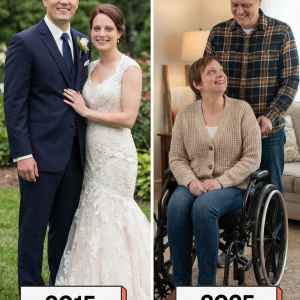They’re still dreaming, all three of them, tangled beneath a thin blue blanket as if it were a king‑size quilt.
We pitched our tent behind a lonely rest area just past the county line. Technically forbidden, but the night watchman’s eyes yesterday said, Stay as long as you need.
I sold my wedding ring three days ago to buy gas and peanut butter, yet I told the boys we were on a guys‑only camping trip—pure adventure. They’re young enough to believe me; they still think cereal in paper cups and air mattresses are luxury.
Shelters from here to Roseville keep saying, “Maybe Tuesday… maybe.” Their mother vanished six weeks back—just a note and a half‑empty Advil bottle on the counter. Since then, I’ve been holding bedtime like a fragile vase: bath in a sink, story by headlamp, kiss goodnight.
Last night Micah murmured in his sleep, “Daddy, I like this better than the motel.” It nearly snapped me in two, because he was right—and because tonight I might run out of ways to fake brave.
Morning heat baked the grass as we brushed teeth behind the rest‑stop building. I was ready to break the news—No more camping—when an older woman approached. Mid‑sixties, flannel shirt, gray braid, paper bag in one hand, oversized thermos in the other.
“Breakfast?” she asked, offering warm biscuits, hard‑boiled eggs, and hot cocoa—cocoa, not coffee. The boys’ eyes lit up like campfire sparks.
“I’m Jean,” she said, settling on the curb. “Used to sleep in a church van with my daughter back in ’99. Figured I wouldn’t let you feel invisible.”
For the first time in weeks I told someone everything—about the motel, the note, the endless perhaps. Jean listened, then said, “Follow me. I know a place. It’s not a shelter—better.”
We arrived at a small farm—red barn, white farmhouse, goats in the yard—sign on the gate: The Second Wind Project. “Short‑term stays for families in crisis,” Jean explained. “No paperwork, just pitch in.”
That night we slept in real beds—four of us in one room, but with walls, light, and a humming fan. I tucked the boys in and cried on the floor where they couldn’t see.
Days filled with chopping wood, mending fences, milking goats. The boys made friends with twin girls from another family; they chased chickens, picked berries, said grace over every plate.
One porch evening I asked Jean how she’d found this haven. “I didn’t,” she smiled. “I built it. Wanted to be a signpost, not a memory.”
Six weeks later I’d saved enough from odd jobs, then a mechanic named Frank slipped me a paycheck and said, “Come back Monday.” We moved into a slanted‑floor duplex on the edge of town the day before school started—pipes groaned at night, but it was ours.
Three months on, an envelope appeared under our doormat: a photo of young Jean holding a baby in front of the same barn, and a note: What you gave my mom, she gave to you. Pay it forward. The farm gate now read: Resting Now. Help Someone Else.
So we did. I fixed a neighbor’s sink, delivered groceries to an elderly widow, donated our tent to a man newly jobless. Then one night a father with two scared kids knocked, and without thinking I made cocoa and laid out blankets on our floor.
That spark grew—Frank hired the man, friends provided furniture, and our crooked little duplex became someone else’s second wind.
I used to believe rock bottom was the finish line. Turns out, for some folks, it’s the trailhead.
Micah still boasts to classmates about “the summer we lived on a farm and built fences while goats watched.” Every night when I tuck them in, I hear his sleepy verdict: Daddy, I like this better.
So do I, buddy. So do I. Sometimes the lowest valley is the richest soil for roots you didn’t know you had.
If this story touched you, share it. You never know who else might need their own second wind—and whose knock you’re meant to answer.





